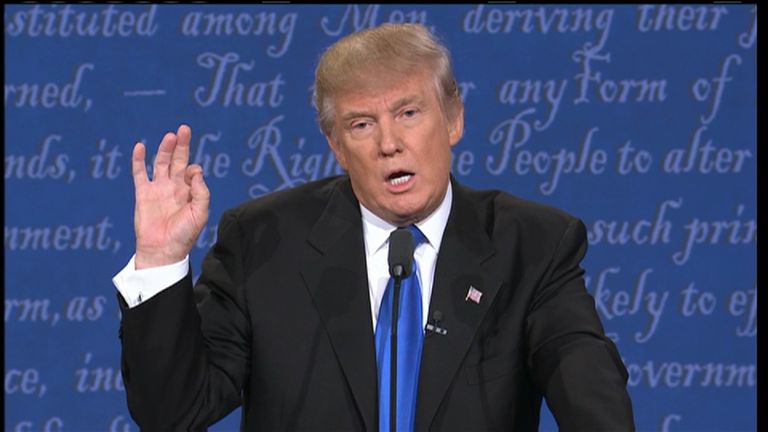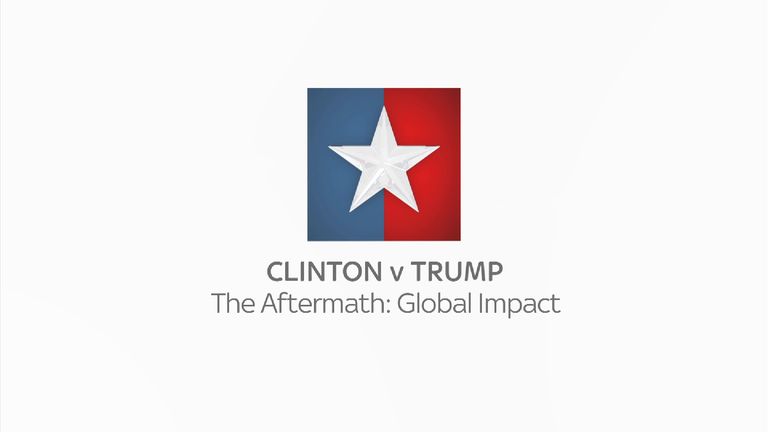US Election 2016: How the world views the White House race
Sky News' team of correspondents look at how the two candidates are viewed around the world ahead of election day.
Saturday 5 November 2016 11:36, UK
The 2016 presidential election has been attracting wall-to-wall coverage in the US as the race has become increasingly narrow ahead of 8 November.
But what is the view of the contest for the White House around the world? Sky News' team of correspondents take a look:
:: Israel
Alex Rossi, Middle East Correspondent
It is at the moment the big question in the holy city of Jerusalem - "What will America's next president mean for Israel?"
The relationship with the US has been strained over the last eight years. President Barack Obama and Israeli leader Benjamin Netanyahu have had major public spats at times.
Disputes over the handling of Iran, the treatment of the Palestinians and settlement building in the occupied territories made for great headlines and left the world with the impression that there was no love lost between the two men.
So will the tensions persist?
US policy towards Israel has historically transcended whoever's feet are under the desk in the Oval Office - it is strategy not tactics, remember.
Shared interests and values still create a common bond but the US is changing - and so too is Israel.
The American Jewish community is more divided than ever before on Israel and its policies towards peace and the Palestinians.
Israel's coalition government has been described as the most right wing in history and the expansion of the settlements - in terms of population density - means there are now more than half a million Israelis living across the 'Green Line' in the West Bank.
For the US, a country steeped in constitutional liberalism, these issues could drive a wedge between the two countries.
:: India and Pakistan
Neville Lazarus, India Reporter
Never before has the US election been watched so carefully here in New Delhi and Islamabad.
Whoever wins will have to hit the ground running as hostilities between the two nuclear-armed neighbours are running ever so high.
During his campaign Donald Trump has equated the relations between the two countries as a "very, very hot tinderbox".
Hillary Clinton is concerned about Pakistan running full speed to develop tactical nuclear weapons in their continuing hostility with India.
Both acknowledge the gravity of the situation.
The peace process between the two countries is almost broken, and infiltration and subsequent attacks by militants on security forces have led to military strikes.
There are near-daily ceasefire violations across borders killing dozens as both governments refuse to engage in talks.
Over the last few years India has tilted towards Washington while Pakistan has hedged its bets with China for economic and military ties.
Delhi fondly remembers the Clintons when they began engaging with India in the mid 1990s, but it has been the Republican Party that India has had close and substantial co-operation with, particularly on nuclear issues, trade and security.
:: China
Katie Stallard, Asia Correspondent
A recent editorial in China's Global Times newspaper summed up the choice now before American voters as: "Republican Donald Trump is seen as an unreliable lunatic, while Democrat Hillary Clinton is believed to be a liar that can't be trusted."
Viewed from China, this election is not just about the two candidates going up against each other, but the very system of Western democratic politics they represent.
An earlier edition pointed out that "Mussolini and Hitler came to power through elections", noting comparisons with Mr Trump. The subtext is not subtle.
The further this election cycle descends into scandal and acrimony, the more citizens here are told to be grateful for the comparative stability of one-party rule.
It is excellent public relations for authoritarian rulers everywhere.
As to who China's leadership actually wants to win, there is certainly no love lost with Mrs Clinton who they see as hectoring on human rights and anti-China - but Mr Trump is unpredictable.
And fun though this whole spectacle has been, ultimately the Communist Party values stability above all else.
:: South East Asia
Tom Rayner, Foreign Correspondent
In the Asia-Pacific region, political leaders play a game of allegiance and the two candidates in the US election are likely to bring very different tactics to the table.
It is a diplomatic arms race - competing with expansionist China to woo other countries in the region. The more on side, the better.
The new player will face immediate decisions, not least how to deal with the tub-thumping anti-Americanism of Philippines President Rodrigo Duterte.
Mr Obama has refused to meet Mr Duterte, and issued withering statements, but has refused to be drawn into a major scrap with a historical ally.
Mrs Clinton would probably do the same. But it seems deeply unlikely such tolerance would be afforded to Mr Duterte by Mr Trump. And that is where things get interesting.
A long-standing characteristic of US policy in Asia-Pacific has been tolerance towards allies, allowing them to mouth off from time-to-time, to bite the hand that feeds them.
It has never been about being friends for the sake of it - the bottom line is maintaining better overall relations with those individual countries than the relations they have with the Chinese.
:: Europe
Mark Stone, Europe Correspondent
All but one of the EU member countries have signalled, openly or otherwise, their desire for a win for Mrs Clinton. Only Hungary's right-wing populist Viktor Orban has endorsed Mr Trump.
Most main opposition parties in Europe also support Mrs Clinton.
If she wins the White House, it would represent a degree of continuity for the trans-Atlantic relationship. She is a known quantity. She may be more interventionist than Mr Obama, but that presents manageable, established challenges that Europe is used to.
Mr Trump represents the unknown. European governments have paid closer attention to him as the campaign has progressed.
In July he put conditions on US military support for NATO allies. With an increasingly assertive Russia on Europe's eastern frontier, this could become problematic quickly.
American support for the European project has, subtly, been key over the past decades, encouraging co-operation.
A Trump presidency, with its domestic, nationalist priorities, could further damage an already wounded European Union.
Lots of questions surround the prospect of Mr Trump winning the election, because the truth is Europe is not sure what to expect.
:: Canada
Amanda Walker, US Correspondent
A gesture of sympathy and encouragement - "America, you guys are already great" - referenced the ubiquitous Trump campaign mantra.
Canada is used to being in the shadow of her big brash sister - this message put forward by an ad agency was like putting a hand on her shoulder and saying "you'll get through this".
Lots of Americans joke about "moving to Canada" if Donald Trump wins.
Judith Timson writes a weekly column in the Toronto Star. She said: "It's the number one topic of conversation here and two words are being used - anxiety and fascination.
"It's an amazing spectacle but there's also high anxiety about who's moving in next door - is it the bigot and the bully or is it a woman who's going to make history?"
The world is watching this unprecedented election but geography makes the Canadian perspective more intense.
Mr Trump says the North American Free Trade Agreement (NAFTA) is the worst deal ever, while Mrs Clinton has more recently been trying to distance herself from the US, Canada and Mexico agreement she once supported.
The rise of protectionism could be a challenge for Canada.
:: Africa
Alex Crawford, Special Correspondent
The self-appointed police officer of world democracy appears to be hovering remarkably close to electing a leader who does not seem to be much of an advocate.
Decades of having a metaphorical American finger wagging at African leaders who pay scant regard to democratic principles may just be about to come to an end.
A President Trump seems to promise an authoritarian leadership bent on protectionism and isolationism with little sympathy for those who are different to him or who are not American.
We can certainly fairly assume a President Trump may be against handing out dollops of aid or even continuing liberal free trade agreements.
On the other hand, Africa knows much more what it is getting if Mrs Clinton moves into the White House.
As First Lady and a former US Secretary of State, she has left a big Clinton footprint over many parts of Africa, particularly South Africa.
But there are many too who doubt her and America's sincerity and who feel she and the Obama administration could and should have done much more for Africa.









